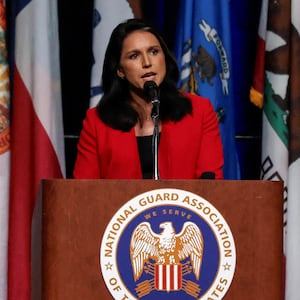Former Democratic representative turned Trump endorser Tulsi Gabbard claimed she is on a Transportation Security Administration watchlist that the agency uses to snoop on “unknown or partially known terrorists” Wednesday.
“Unfortunately, it has not been resolved. I’ve been informed that the targeting package that the TSA created for me when they put me on the secret domestic terror watchlist is still operational,” Gabbard told Fox News’ Sean Hannity on Wednesday night.
In a previous Fox appearance on Aug. 10, Gabbard alleged her name was supposedly added to the TSA’s Quiet Skies program on July 23.
The secretive program was first exposed by The Boston Globe in 2018. It allows federal air marshals to follow U.S. citizens and collect information on their behavior and movements, even if they aren't suspected of a crime or on a terror watchlist.
The Globe reported on a TSA bulletin that said the program aims to stop threats “posed by unknown or partially known terrorists” and that it targets travelers who “are not under investigation by any agency and are not in the Terrorist Screening Data Base.”
Gabbard, a U.S. Army Reserve officer who represented Hawaii's 2nd District from 2013 to 2021, described what it was like being added to the list in her earlier appearance on Fox.
“As I was traveling, I ended up in 30 to 45 minutes of going through screening every time I would go to the airport to fly,” she told the network’s One Nation. “I noticed air marshals, I noticed K-9 teams, there were things that I saw and noticed that were highly unusual. But the deepest pain and harm and stress that’s been caused by this is that forever going forward I will always be looking over my shoulder wondering if and how my government is surveilling me.”
She alleged the monitoring was a violation of her Fourth Amendment rights protecting against unreasnable search and seizure.
An erstwhile Bernie Sanders backer who quit the Democratic Party in 2022, Gabbard subsequently drifted closer and closer to Trumpworld, culminating in her endorsement of former President Donald Trump earlier this week. She was added to Trump’s transition team alongside former independent presidential candidate Robert F. Kennedy Jr.
Gabbard claimed in a statement to the Hawaii Tribune-Herald that her addition to the TSA list “is clearly an act of political retaliation” for her outspoken criticisms of her former party and its presidential nominee, Vice President Kamala Harris.
Earlier this month, Hawaii state GOP Reps. Gene Ward, Diamond Garcia, David Alcos, and Elijah Pierick sent a joint letter to TSA Director David Pekoske accusing his agency of including Gabbard on the Quiet Skies Program watchlist without explanation, adding that air marshals have harassed her and her husband.
“Sir, please remember this is the United States of America and you have not even stated why such a dastardly label has been attached to and besmirched her good name,” the group’s letter to Pekoske reads. “We strongly urge you to immediately withdraw her name from the Quiet Skies program and/or provide full public transparency of the TSA’s reasons for maligning her name and reputation.”
Last week, House Oversight Committee Chair James Comer wrote to Pekoske, stating Federal Air Marshals Service whistleblowers made recent disclosures that FAMS “wasted resources and abused its authority” in surveilling Gabbard.
Sens. Rand Paul (R-KY) and Chuck Grassley (R-IA) have also written letters to Pekoske raising concern about Quiet Skies and Gabbard’s addition to the program.
Paul noted a 2020 Homeland Security inspector general report that said Quiet Skies lacked measures to prevent the misuse of passenger data or oversight to determine whether it was doing what it was supposed to do. He asked the TSA to turn over documents detailing how it selects people for watchlists by Sept. 4, including information on Gabbard’s allegations.
On its website, the TSA says it uses the program “to reduce the risk on airplanes by identifying passengers deemed to be higher risk according to certain travel patterns and other intelligence-based factors.”







